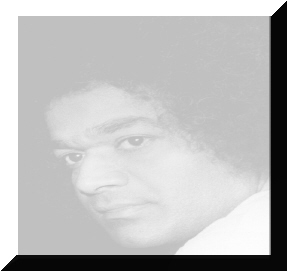

|
|


Shankara's anguished yearning
Sairam,
Prashaanthi Nilayam, 1963
Shankara was one day offering puuja to Dhevi (the household deity) because his father was away and he had asked him to perform worship in his absence. He placed the milk before the image and prayed pathetically and sincerely that she should sip the milk. The Mother melted at his walling and drank the entire quantity. Later Shankara remembered that his father distribute a tiny spoonful of the milk offered to every member of the family. But now nothing remained in the cup as Mother emptied in one quaff. The boy feared that he would be blamed for drinking what was the share of the others and started crying again. The Dhevi felt great pity and filled the cup with milk by pressing her Maternal Breasts. Shankara's avedhana (anguished yearning) had succeeded in matting dhevi respond!
The Ari-shadvargas (the six enemies of Man) are like bats and owls that cannot tolerate light. They get a foothold in man's mind because it is filled with the darkness of Ajnaana. This darkness will flee, disappear and will be destroyed when a lamp is lit.
Shankara taught this simple truth to many who were ignorant of this simple fact and also taught that Vedhas, Upanishads and Shaasthras had but One in view i.e., Adhwaitha. He explained the mahaavaakyas (the great statements on Supreme Reality) of the Vedhas -- Aham Brahmaasmi; Thath-thwam-asi; Prajnaanam Brahma (I am Brahman; Thou art That; consciousness is Brahman) in simple, convincing logic and in sweet captivating poetry.
Temples, images and pictures are the slates and boards for the children in spiritual progress. If you play with a toy elephant, you cannot derive the experience of contacting the real one. The Formless can be conceived only when you have transcended Form. The very first step in saadhana is sath-sanga (good company); the company of the wise and the good will develop into detachment and love of silence and solitude that will promote the disappearance of moha (delusion). When that happens, one is established steadily in the Thath-thwam, the reality of this and that, the identity of this with that. The recognition of that identity is the attainment of Mukthi (liberation).
You cannot taste the sugar of divinity when your tongue is bitter through envy, hatred and pride. Falsehood looks easy and profitable; but it binds you and pushes you into perdition. The status of manhood has been won after aeons of arduous struggle and to waste it in vain pursuits forgetting the Dhivyathvam (Divinity) which has to be manifested is indeed pitiable.
The sea of samsaara (worldly life) has to be crossed and all its Waves transcended with the help of Raamanaama. The Lord always weighs only the feeling behind the prayer. Raama Naama (name) will save you if you have at least the Pithru
Bhakthi and Maathru Bhakthi (devotion to father and to mother) that Raama had. If once you know the taste, no one will give it up or consider it as of lower value. Meditate on the Raama swaruupa (Form of Raama) and the Raama swabhaava (the true nature of Raama), when you recite or write Raama Naama. That will give exercise to the mind and it will be made healthy and strong in the spiritual sense. Make this Dharmaswaruupa your Aathmaa Raama. Rathi (attachment) is the seed; Bhaava (feeling) is the sapling; Prema (love) is the tree; Sath-Chith-Aanandha (Being, Awareness, Bliss) is the fruit.
You entangle and bind yourself and get caught in the trap in this materialistic world. The Guru shows you the road; you have to trudge alone without fear or hesitation. The rules of yoga, bhakthi and karma will brighten the intellect, cleanse the emotions and purify the heart and ultimately, saadhana (spiritual effort) will remove all trace of ego, all idea of duality from the mind of man. Adhwaitha is the awareness of the Divine in everything, everywhere and in full measure. Adhwaitha speaks of the unity of matter and energy; of time and space, of the Universe being.
--SATHY SAI